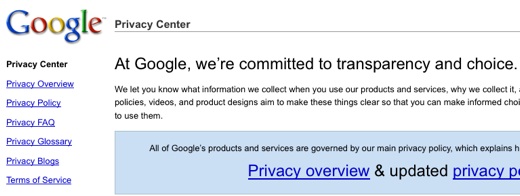
Monthly Archives: July 2009
The Best Online Tools for Personal Finance
Written by SHELLY BANJO

Consumers are paying closer attention to what they buy, how much they save, and where they invest. These resources can be a huge help. Even better, most of them are free.
It’s tougher than ever to plan your finances. But it’s also easier than ever to find help on the cheap.
There are a host of Web sites that help you lay out a budget and track your spending and investments. Some let you set up a plan for a long-term goal, like college or retirement, and others offer advice about where to put your money. And many of these services are free of charge.
To help you wade through all the choices, we scoured the Web to find some of the best online tools and got recommendations from personal-finance pros. Here’s a look at some of the best sites we turned up, in a range of categories.
1. Budgeting Your Money
The first and perhaps most effective step to managing your money online is signing up for basic budgeting sites such as Mint.com, from Mint Software Inc. of Mountain View, Calif., Wesabe.com, from San Francisco-based Wesabe Inc., or Geezeo.com, from Geezeo of Hartford, Conn.
These free sites offer tools to help you keep track of what you’re spending, how much you’re saving and how your investments are performing. You create an account, and the sites automatically aggregate all of your online financial data, letting you keep track of credit cards, home loans and bank and brokerage accounts all in one place.
To help you avoid bank or credit-card fees, these sites can alert you via email or text message when a bank account is low or when a credit card is approaching its limit. And the sites can slice and dice the information to help you budget better. For instance, they will automatically show you how much you spend in any given category, such as restaurants or gas stations, and can compare your spending habits with those of other users, so you can identify areas where you might need to cut back.
Some sites, such as Geezeo and Wesabe, also offer a social-networking element that allows users to share tips and advice on a range of money-management issues.
One big caveat: Many of these sites need usernames and passwords for your various online financial accounts to get access to your data, says Jim Bruene, founder of online-banking research company Online Financial Innovations and Finovate, a conference series showcasing online financial tools and companies.
Some sites, like Wesabe, allow you to download statements from your bank or credit-card company and then upload them manually. This can be more time-consuming but a comfort to those who don’t want to give up their passwords, Mr. Bruene says.
There are other caveats to consider when using the sites. For instance, Mint.com showcases advertisements of financial-services companies and shows ads based on your activity on the site. (If you spend a lot on restaurants and gas, for instance, the site may suggest a reward card tied to those kinds of purchases.) Critics say this may create a conflict of interest, since the site is ostensibly trying to help you save money.
Mint.com notes that users must deliberately choose to click on the “Ways to Save Tab” displaying the offers. Donna Wells, the site’s chief marketing officer, says that when users decide to accept an offer, they “save real dollars, the financial institution gets a new customer at a low cost of acquisition, Mint.com sometimes, but not always, receives a small referral fee from the provider. That’s how we keep the Mint.com service free.”
2. Creating a Financial Plan
Moving beyond simple budgeting, a number of Web sites offer tools to help users keep track of and plan for their complete financial life. Experts say this can be a good starting place for jobs such as assessing your retirement goals, and figuring out how to structure your investments, spending and saving to achieve them.
But the pros caution investors to consider carefully before accepting product suggestions and investment advice. “There will always be a group of hard-core self-directed investors who will try to do it all themselves, but we see most people using these sites as a warm-up tool to financial planning. If they want to seek something more rigorous, they will go to a financial planner,” says David Schehr, a research director with Gartner Inc.’s Industry Advisory Services.
With that in mind, here are some popular sites.
SimpliFi.net, from SimpliFi LLC in Winston-Salem, N.C., uses a virtual financial adviser named Sophie to guide you through a planning process based on financial goals, such as saving for retirement or reducing debt. The site assesses how much you should spend and save to reach your particular goal and tells you how likely you are to achieve it with a “Goal Point Average” ranging from A+ to F. (You don’t give the site any of your financial-account information, but you do have to input approximate balances.)
The site can provide details on how much you need to save over a certain period to reach your goals and offer recommendations on types of investments to consider. The site is registered with the Securities and Exchange Commission, which offers investors a measure of protection: Among other things, the site must comply with SEC rules for registered investment advisers and is subject to examination by SEC staff.
Another site, Planwithvoyant.com, from Voyant Inc. of Austin, Texas, helps investors forecast the impact of unforeseen events. Step-by-step wizards guide you through the initial preparation of a financial plan, such as identifying your goals and entering income information and expenses. Then charts and graphs show your current financial condition and allow you to test the financial effect of what-if scenarios, such as an unexpected pregnancy or an early retirement. You can also run simulations on how to mitigate those risks, say, by adding insurance or altering your investment strategy.
For specific questions and advice, you can reach out to Voyant’s online community forum or check in with a financial professional in your area. If you choose this free option, you’re presented with a list of local advisers, where you can check out their credentials and choose to ask one of them for feedback. (The site says advisers in this service must be registered with the Financial Industry Regulatory Authority, or Finra. They pay for subscriptions to the service, and offer help, as a way to drive new business.)
Investors can also try ESPlannerBasic (Basic.esplanner.com), from Boston-based financial-software company Economic Security Planning Inc., which offers a free plan developed by Boston University economics professor Laurence Kotlikoff.
You enter your current and projected salary, retirement age and savings, among other things. The site calculates your sustainable living standard and allows you to tinker with how much a job change, housing move or retirement-account contribution can raise or lower your living standard.
Then the program recommends annual amounts of discretionary spending, savings and life-insurance holdings. The program incorporates a lot of the nitty-gritty details other programs tend to leave out, such as federal and state taxes and future Social Security benefits. But the process can be time-consuming—it takes up to 30 minutes to fill out all the necessary information. What’s more, the basic version stores your plan for only 24 hours, so every time you want to run the simulation, you must input the numbers.
“As you add complexity, it takes more time and effort to use these sites, and most people only want to bite off as much as they can chew,” says Mr. Schehr of Gartner.
3. Tracking Investments and Getting Advice
A growing number of investors are flocking to Web sites that allow them to track their portfolios and compare their choices with others in the community, including financial gurus like Warren Buffett and Jim Cramer.
People are looking for truly objective advice, not suggestions from advisers who are making commissions off trades, says Ron Shevlin, a senior analyst at Aite Group LLC, a Boston research-advisory firm that focuses on the financial-services industry.
He points to SocialPicks.com, from FinancialContent Services Inc., a financial-data and business-news company in Foster City, Calif., and New York-based Covestor Inc.’s Covestor.com. These sites allow you to keep track of your own investments and compare your portfolio’s performance to that of peers, professional analysts and financial bloggers.
For instance, SocialPicks.com’s Blogtracker feature automatically tracks performance of financial bloggers, various Wall Street legends and professional analysts based on blog posts and other online information.
San Francisco-based Cake Financial Corp.’s CakeFinancial.com also allows investors to track investment portfolios but in addition lets them aggregate all of their portfolios in one place, analyze past performance up to 10 years and compare portfolios with other users.
Cake’s comparison tools look at your current investments and find similar replacement funds with lower fees and expenses. In addition, the site lets you create a watch list, or list of positions that you’re interested in tracking, by performance and the number of Cake users who are buying or selling.
What other people do isn’t necessarily right, but at least it gives people context to make a more informed decision, Mr. Shevlin says.
For investors who want more advice, Mr. Shevlin suggests Portfoliomonkey.com. At the site, from San Francisco-based Portfolio Monkey Inc., you enter your portfolio’s ticker symbols and number of shares, and the site analyzes your current allocation’s expected return and losses, based on analytics evaluating historical volatility and performance.
The site can help you reallocate your portfolio, or offer recommendations for stocks that have a low correlation with your portfolio and high expected returns. You can go through those stocks and see how adding them would affect the portfolio.
Mr. Shevlin cautions, though, that the site is fairly new. “It’s promising to provide guidance. Whether or not they can actually deliver that is left to be seen,” he says.
Jay Liao, co-founder of Portfolio Monkey, says, “There is a line between recommendations and investment advice, and that’s a line we don’t want to cross at this point, but there are suggestions we can make for a user’s portfolio that can be informative and data-driven.”
Mr. Liao says Portfolio Monkey is bringing analytics and simulation tools to investors that previously were available only to financial professionals. “At the end of the day, the user gets a more diversified portfolio that produces more return at lower risks,” he says.
4. Checking for Fraud
For investors spooked by recent financial scams and scandals, the Financial Industry Regulatory Authority offers tools to monitor stockbrokers and identify and avoid fraud.
At Finra.org/BrokerCheck, you can check the professional background of current and former Finra-registered securities firms and brokers, as well as find any regulatory complaints or customer disputes.
You can also see a listing of the broker’s current registrations, licenses or exams passed. The Securities and Exchange Commission offers a similar check for information about investment-adviser firms at Adviserinfo.sec.gov.
Finra.org/Investors/ToolsCalculators offers Risk Meter and Scam Meter tools, which walk you through a series of questions aimed at identifying vulnerable individuals and investments. For instance, the Risk Meter asks you if you have checked with a securities regulator to see whether an investment professional is licensed. Based on the responses, the tool offers suggestions on how to combat fraud.
Likewise, the site’s Scam Meter allows you to check if an investment is too good to be true, asking questions such as: How did you learn about the investment opportunity, and what have you been told about it? From your answers, the site offers warnings and advice.
“It’s not the most gee-whiz slickest thing out there, but it’s helpful for investors who are afraid of getting into investing because of recent scandals and the economic meltdown,” Mr. Shevlin says.
5. Keeping Track of Credit
With credit scores determining everything from car-insurance rates to getting a mortgage, “understanding and managing your credit score is incredibly important to your entire financial life these days,” Mr. Shevlin says. He suggests CreditKarma.com, “which offers a truly free score and advice on how to improve it,” he says.
You don’t have to give the site your credit-card information, as you do with a traditional credit bureau. But CreditKarma, from San Francisco-based Credit Karma Inc., will ask you for your address, phone number and Social Security number. (The site says it doesn’t store the number.)
Once you submit that information, the site will give you your score—but not the entire credit report—and show you how you stack up against other users in various categories, such as overall users, or those in your state or age group.
Starting tomorrow, the site will help users identify major influences on their score, such as credit-card utilization and on-time payment history. The site uses scores generated by credit-reporting bureau TransUnion LLC.
Mr. Shevlin cautions users to be prepared to see credit-card and other product offers on the site. But he notes that users can rate the offers on whether or not they are helpful, and the site adjusts ad placement based on feedback.
6. Managing Loans
One site claims it can smooth out a potentially tricky financial arrangement: borrowing money from friends and family.
Virginmoneyus.com, operated by Virgin Money USA, in Waltham, Mass., a Virgin Group company, lets you use the site to create formalized personal loan documents that set interest rates and repayment plans. The site can also manage repayment using electronic funds transfer, email reminders and year-end reporting.
The cost: $99 to $199. The company also offers the service for business, real-estate and student loans, for various prices.
Virgin Money claims that formalizing loans increases the chance of repayment. Note, though, that it won’t lend money or match you up with a lender. The site only manages the loan between you and someone you have already identified, such as your grandmother or college buddy.
–Ms. Banjo is a staff reporter for Dow Jones Newswires in Jersey City, N.J. She can be reached at [email protected].
9 Must-Have Features We Want to See in a Google Chrome OS
Written by Kevin Purdy

What’s inside Google’s just-announced Chrome Operating System? How does it work, exactly? Nobody outside Google knows. We can, however, build a dream operating system from the ground up, and that’s what we’re doing with some help from the hive mind.
We asked on Twitter what features users wanted to see in Google’s Linux-based, web-focused operating system, due to be released in code later this year, then on sponsored netbooks in the second half of 2010. We’ve compiled nine must-have features that we’d like to see from Google’s upcoming operating system here.
Speed, Speed, Speed
“Well I’ll be more than happy with a 10 sec. boot time. Also, Google should drive software companies to consider Linux seriously.”
“if they want me to care, it has to make me go “holy crap, THIS IS FAST”; just like did when I started using chrome”
There are two schools of thought on the boot-up speed wars-one being that, if you’re going to work all day on a computer, a few more seconds at start-up don’t really matter. The other idea, though, is exactly what Google’s aiming at: the netbook as something you fire up, quickly jump on the net with, then suspend or shut down when you’re done or moving again. If Google can recreate the relative speed of Chrome as a browser to Chrome as an operating system, it’s definitely going to open more eyes.
Of course, it’s not just about boot-up speeds. Regardless of how quickly an operating system boots up, what matters the majority of the time is how fast it works when you’re actually using it. Google will probably be aiming for the sweet spot between kitchen sink functionality and fast, lightweight operation. We’d guess that the first few releases will be fairly barebones to keep things snappy.
Seamless Syncing of Your Browser and Desktop
Browser with syncable bookmarks. Thats A+ #1!!
It is odd, isn’t it? Despite the plethora of syncing services, there is still no viable bookmark synchronization service for any browser you want, whether on your phone or across desktops. Fixing this would go a long way toward demonstrating Google’s commitment to openness-even in an OS named after their own browser.
We’d go even further and suggest syncing all over the place. For example, I want instant, no-brain-needed synchronization of files and cloud data-whether through a “G Drive” or Dropbox or my own server space-between my laptop, my browser access, and my Android phone (or, in my Happy Land fantasy on Lollipop Lane, any phone out there).
Integrated Quicksilver/Quick Search Box
 Friend of Lifehacker and Quicksilver/QSB developer Nicholas Jitkoff is one of the folks at Google working on Chrome OS, and we’ve heard that he plans on integrating something Quicksilver-like into the OS, so that’s at least something that Quicksilver, Launchy, and Ubiquity geeks like us can get excited about.
Friend of Lifehacker and Quicksilver/QSB developer Nicholas Jitkoff is one of the folks at Google working on Chrome OS, and we’ve heard that he plans on integrating something Quicksilver-like into the OS, so that’s at least something that Quicksilver, Launchy, and Ubiquity geeks like us can get excited about.
Keyboard Shortcuts and Other Power-User Considerations
 Apart from Quicksilver dreams, crazy keyboard shortcuts, along with all the small productivity pieces that power users love from their OS of choice, may not make all the difference to just anyone, but if you want to win over the Lifehacker crowd, your OS better be plentiful with shortcuts.
Apart from Quicksilver dreams, crazy keyboard shortcuts, along with all the small productivity pieces that power users love from their OS of choice, may not make all the difference to just anyone, but if you want to win over the Lifehacker crowd, your OS better be plentiful with shortcuts.
Support for All Kinds of Hardware
“I’d love to be able to load Chrome OS on my eight year old laptop and see it speed along. any chance of that?”
The Linux kernel that Chrome OS will run on is notably adaptive and swift on older processors with less memory. That said, compatibility with peripheral hardware like video cards, Bluetooth devices, and, especially, wireless networking gear, is the reason most clear-eyed Linux fans can’t quite say it’s ready for mass appeal, so it’ll be interesting to see how Google navigates this terrain. It’d be great if Google could churn out a lightweight OS that would work well with aging hardware as well as cutting-edge netbooks.
Further Blurs the Line Between Web and Desktop
“cloud storage (seamless) separately launchable webapps IE Fluid on OS X, fast standby/resume, ability to export settings to liveCD”
Wow, that’s a mouthful (tweetful?). Fluid/Prism-like apps seem like a given, based on what we’ve seen in Chrome’s built-in “application” powers, but it’d be nice to see web and desktop integration grow even stronger. Let me drag attachments into Gmail or access all of my apps whether I’m online or off. Last, we kind of think that live CD export is just a great idea.
An Eye for User Privacy
“must-have for chrome OS: no google snooping on me”
This will be the conversation that rises once the initial turbulence of “Google Trying to Kill Microsoft?” subsides. There will be license agreements and privacy disclosures, sure, but those concerned that Google’s holding too much of their personal data now have to contend with an operating system where “most of the user experience takes place on the web.” Let’s hope for controls, placed somewhere accessible, that let one control just how much data is saved, collected, and reported.
In a similar vein, total encryption of passwords and user data (in the case of loss or theft, a la BitLocker/FileVault) would be great. We’re particularly concerned about saved password encryption for web pages and (Wi-Fi) networks, and presumably so is Google.
Support for Current Linux Applications
As it’s built, Linux apps should work. Having wine in to allow windows apps would be nice. Running mac apps [would] be brilliant.
Linux apps can likely be made to work on Chrome OS, but many Linux apps work on just a choice distribution or two (these days, mostly Ubuntu and Fedora), then are painstakingly ported to meet other distributions’ library/system/kernel requirements. Google has experience tweaking WINE to the needs of their apps like Google Earth and Picasa, and could potentially make it more accessible for Windows porting. As for the last bit: Sure Mac compatibility would be “brilliant,” but also very unlikely.
Enterprise Friendly
“must have? for enterprise use, must run Salesforce.com, Oracle, SAP, etc in browser with no hitches. Oh, and Google Apps.”
A good question, and one we’d expect for any new platform. We’d assume that Google can’t, or won’t, rewrite their browser product to support proprietary protocols or handlers, but would hope that the increasing popularity of standards-compliant browsers will push enterprises down that road. It’s not that sexy for general consumers, but it could make a huge difference in widespread adoption, especially if Google wants their OS to compete with Microsoft.
Bonus:Google knows me so well

There’s still plenty of room for discussion on the must-have features of a modern OS, so tell us what you’d like to see included, or stripped out, in the comments.
14 Basic Skills All Men Should Possess
Written by Sean Percival
In today’s modern world there are many things we take for granted, many things our fathers would have known how to do, and some others that might baffle them. Additionally, on average, Americans and European men are starting to get married older, meaning that there is now a need to be self-sufficient in things long-considered to be within the realm of the woman. Whether you’re out camping, or at home or work, there are some basic skills a man must possess. The following are fourteen of examples of these skills – if you don’t know them, you should learn them, or you may be caught unaware sooner than you think. If you can think of others, please leave them in the comments below.
Drive a Stick-Shift
It’s a sad thought that more men, every day, are coming of age with absolutely no experience driving a stick-shift. To really add insult to injury, there are more men running around who don’t know how to drive a car period, but they’re beyond help if they’re that far gone. Driving stick is not a difficult thing to learn, and you don’t need to own a manual-transmission vehicle to acquire this skill. Have a friend teach you, hell, rent a car if you have to, it only takes a couple of hours to get the hang of it. At some point, just about everyone comes across a situation when they need to drive someone else’s car, and there’s a pretty decent chance that car will be stick. You’ll want at least a vague familiarity with it.
Hook up an Entertainment Center
There is absolutely NO excuse for this one. It’s now 2009, TV’s with wires coming out the back of them haven’t been new or fangled for 20 years. The wires are color-coded, and even labelled with handy names like “input” and “output.” Here’s a hint, if something outputs, there’s an input somewhere waiting for it. With HDTV’s on the rise now, it’s even easier with HDMI plugs, since there’s only one cable. Your grandfather may get away with having the Geek Squad come out to the house to install his new TV, but you need to man up and handle your own business.
Fix a Toilet
Everyone has a toilet, most houses even have more than one. They’re not new and they’re not that scary inside, either, yet somehow this all goes out the window the moment that flush handle stops making noises. Odds are, if you take the lid off the back of the toilet and peek in there, you’re going to immediately see what’s wrong. It’s not a complicated assembly, and if you really can’t figure out how the flapper works, the guy at Home Depot will be happy to take one and half minutes to explain it to you.
Navigate a Map and Use GPS
There should never be any instance when a man is handed a map and says “I don’t know what I’m looking at here.” It may sound silly to some, but it happens every day. The culprit is usually the same guy who can’t drive. Roadmaps aren’t exactly of the difficulty level the Goonies had to deal with; they have clearly marked labels and landmarks, just like the road you’re on. The same goes for ditching the map and using a GPS device, which are built to be easy enough to operate one-handed and without looking. That’s their purpose, so you shouldn’t have a problem learning how to use one.
Change the Oil
Granted, in a decade or so cars that even have oil to change will be much less common, but right now they’re the run of the mill and have been since your grandparents were toddlers. Every man should be able to, if needed, change the oil in his car, as well as swap the spark plugs and the air filter. These three things make up the bare minimum maintenance-skills trifecta for car-owners. The only exception to this rule would be if you grew up filthy rich, and only drove cars that required special garage tools and special knowledge and calibration. That’s probably not you.
Balance a Checkbook
A man needs to be able to manage his money. That’s just a simple fact of life, a part of growing up, and a major factor in whether or not he spends his life alone and miserable. Now, while it’s true that money isn’t everything, it definitely matters quite a bit. A woman isn’t necessarily shallow if she doesn’t want to spend her life with a guy who can’t keep his bank account from over-drafting, she’s just got good sense.
Cook the Perfect Steak
A timeless symbol of manhood, cooking the perfect steak is a long sought-after goal for any man who’s ever touched a grill. It’s just one of those things we all have to strive for in life. On top of that, it’s a great way to garner respect around the neighborhood, and it’s sure to get you a reputation as a good cook regardless of any actual cooking skills. The last thing you want is for your own wife or girlfriend to ask that you let your friend man the grill on the 4th of July. It should always be you.
Swim the Breaststroke

The need to be able to swim is one of basic survival. If you fall into a body of water, you need to be able to get back out, otherwise you’re a danger to yourself and others. You don’t need to be an Olympic-style swimmer, but you should at the very least be able to pull off a breaststroke if your life depended on it, and it might, you really never know. If the whole impending doom thing doesn’t sway you, then the fact that you look lame dog-paddling across the lake might.
Write Effectively
Unless you plan on spending your entire life working construction, and not as the foreman, you’re going to have to write more than one paragraph at some point. When that time comes, you need to be able to string something together that’s both coherent, and correct. That means spelling, grammar, and proper punctuation, all things taught throughout high school. If, like most young men, you weren’t paying any attention during high school and now can’t write a paper to save your life, there are plenty of resources available on the Internet; take some time and rectify your mistakes before it’s too late.
Dress for the Occasion
Jeans and a T-shirt are great, every guy needs to be comfortable, and nobody would fault a guy for wearing his favorite jeans to the store. That’s a far cry from going to a job interview, a wedding, or to a yacht party dressed like this. A man needs to have a presence and that means not looking like a drowned rat in unwashed clothes. You need to be able to dress yourself, and women will attest to this. It may be a little more expensive than the thrift store, but the payoff is ten-fold. If you lack fashion sense, and many men do, take a woman with you. There is no better shopping partner than a fashion-conscious woman.
Sew a Button
Yes, you can run around asking every woman in sight if she can help you fix your broken button, but you’re going to look like a jerk. It’s pretty easy to fix a rogue button if you can get ahold of a needle and thread. All you need to do is thread the needle, and then start looping it through the button holes and fabric. It doesn’t have to be pretty, it just has to keep the button on your clothes until you can replace them or find someone to do a professional job (like your mother). The last thing you want to do is to just walk around missing a button, that just looks ridiculous.
Do Laundry Properly
Many men get away without the most rudimentary of laundry skills, but they’re the guys who only own one pair of Levi’s and three black T-shirts. Socks and underwear are always optional to these gentlemen and they live the perennial single life. A man needs to be able to take care of his clothes, and that includes sorting them to allow for color-bleed as well as fabric types. The dryer can also be a deal breaker- even when washing correctly, and you don’t want to end up with a shirt that fits a 10 year old. Learning this skill is actually a pretty involved, drawn-out process, but with enough trips to the laundromat, and enough stupid questions annoying the women that happen to be there, you can learn how to handle your clothes like a fashion expert- and maybe even get a date while you’re at it.
Handle Roadside Emergencies
If you’re going to be out on the road, then you need to be able to handle a flat tire or jump a battery. Not knowing these two simple things can be just as bad as walking into the desert with no water. It’s also important that you be able to stop to help others who are stranded on the side of the road when they don’t know how to change their flat tire.
Build a Fire
Much like swimming, this is a basic survival skill that mankind developed long ago. There is always the off-chance that you may need to spontaneously build a fire, and you should have at least some inkling of how to go about doing it if the need ever arises. You don’t need to become an expert fire-starter, but you should at the very least be aware of the various methods that exist. There is no shame in taking the easy way out; always having a lighter, or a book or box of matches on hand. Weatherproof matches in your glovebox are always a good idea, and flint-strikers are cheap and non-combustible alternatives as well. Man discovered fire, don’t be the guy who never learned how to use it.
10 Most Annoying Airline Passengers, As Told By a Flight Attendant
Written by Brandi Lynn
 If I could have one superhero power it would be the ability to snap my fingers and get to any destination I could dream of. But I’m a mere mortal so I had to become a a wing-wearin’, heel-stomping, drink-slinging flight attendant.
If I could have one superhero power it would be the ability to snap my fingers and get to any destination I could dream of. But I’m a mere mortal so I had to become a a wing-wearin’, heel-stomping, drink-slinging flight attendant.
People like asking the same questions over and over. My worst flight ever? Stuck with a passenger drunk off his socks. Favorite destination? Rome. Ever dated a pilot? Oh my god, NO.
But no one ever stops to ask me the question I’m dying to answer: What can a passenger do to annoy a flight attendant? So now it’s my turn. I present the 10 Most Annoying Passenger Habits.
10) Frowning Faces: I like smiles. I especially like them come row 40, so please, throw a smile my way. Sounds easy enough, right?
9) Misuse of Overhead Compartments: If you’re one of the first 10 passengers to board, shoving your jacket into the overhead bin is a total a-hole move. It’s frustrating to have to check someone’s carry-on because your jacket has taken up half the overhead bin when it could easily have gone under the seat in front of you.
8) Creating Obstacles in the Aisle: Legs, feet, shoulders, elbows, knees, heads … bags, purses, shoes, pillows … Aisles are small. Galley carts are big. It’s hard seeing around a 200-lb. galley cart, so I hit countless body parts daily (and feel terrible doing it). I’m asking — no, I’m begging — please keep all of your personal objects, and your person, out of the aisle until I’ve passed you. Then, feel free to take the aisle back over.
7) Rolling Your Eyes When I Can’t Help You Hoist Your Carry-On Into the Overhead Bin: I understand that you might need a hand getting your luggage into the overhead. I can’t risk hurting myself for you or your bag — I don’t want to get an OJI (on the job injury) and be out of work. I’m genuinely sorry I have to say no. I really am … until you roll your eyes. Then, you’ve lost all sympathy
6) Not Paying Attention to My Exit-Row Briefing: Your chatting on the phone/talking to the person next to you during my exit-row briefing is not only annoying, but it gives me the right to remove you from that row with extra leg room. I have to know you are willing and able to do what I’m asking. It’s simple. Listen for a minute (yes, I know you’ve “heard this 200 times before, but it’s not going to kill you to listen again and then I’ll be on my way. That simple.
5) Leaving Your Headphones on While Ordering: “Whaaaaat?” Press pause, take them out for just a tiny moment and tell me what you want. I’ll love you for life.
4) Telling Me What My Job Is: I’m paid to handle an emergency situation. My slinging drinks, chat-chatting and being friendly while bringing you blankets, tissues, cups of water and little peanuts is just an added bonus for you. If you have a heart attack and there’s no doctor on the plane, I’m there and can try to keep your heart going. So please, please do not tell me what my job is.
being friendly while bringing you blankets, tissues, cups of water and little peanuts is just an added bonus for you. If you have a heart attack and there’s no doctor on the plane, I’m there and can try to keep your heart going. So please, please do not tell me what my job is.
3) Complaining About My Limited Food Supply: We know airlines used to serve free, hot meals in main cabin. We also know many airlines have gone bankrupt in the past 10 years. They have had to make cuts — from no meals to fewer flights to outrageous bag-check fees — which suck all around. But I have no control over that, so please keep your comments to yourself — or write a letter.
2) Handing Me Dirty Diapers: Ewww. There is a lavatory on every airplane with a very nice and well-functioning garbage can. Enough said.
1) Poking Me: It’s rude to point, so it logically follows that it’s super-rude to poke/touch/rub/violate your crew members. Keep fingers and hands to yourself please. I have enough bruises from pointy fingers jabbing into my shoulder and butt to last a lifetime.
Bonus Tip: Bring any kind of candy for a crew member, and you are pretty much getting special treatment from that point on. We always remember those nice folks toward the back who brought us some Hershey’s Kisses …
Read more about Brandi’s adventures both in-flight and on the ground at her blog Excess Baggage
10 Things Gas Stations Won’t Tell You
Written by Jim Rendon

1. “Good luck finding the best deal.”
When it comes to gas prices, most stations are branded — meaning the name of a major oil company hangs out front — and must buy gas from their proprietary company. They can’t shop around.
With a lock on sales, the oil companies charge each station a different price depending on various factors, such as the station’s competition and its location. That means a station might have to pay a lot more than one down the street, and that cost gets passed along to you.
Faced with such instability, Gainesville, Fla., resident Steven King plans ahead: “If I know I’m going out of town, I try not to buy gas, so I can fill up after I leave.” King says he can save 10 cents a gallon by purchasing gas on the road. You’d be similarly wise to shop around because with prices constantly in motion, the cheapest gas may not be at the same station every time.
2. “I hate it when gas prices go up.”
Stations earn, on average, 10 to 15 cents on a gallon of gas. Ironically, they earn the least when prices are highest. When fuel climbs, gas stations usually must shrink their profit margins to remain competitive, meaning they earn less per gallon.
But another big cost during tough times is something they can’t do anything about: credit card fees, which add up to about 2.5% of all purchases. When gas is at, say, $2 a gallon, stations pay credit card companies 5 cents a gallon; when gas hits $3, that fee becomes 7.5 cents, at least half of the stations’ average profits.
“Those credit card fees are miserable for the gas station business,” says Mohsen Arabshahi, who owns five Southern California stations.
How do station owners make up for lost revenue? “Prices go up like a rocket and come down like a feather,” says Richard Gilbert, a professor of economics at the University of California, Berkeley. For several weeks after wholesale prices drop, stations can earn as much as 20 cents a gallon before retail prices are lowered to reflect the change.
3. “My gas isn’t better for your car; it’s just more expensive.”
Oil companies spend lots of money explaining why their gas is better than the competition’s. Chevron’s gas, for example, is fortified with Techron, and Amoco Ultimate is supposed to save the planet along with your engine. But today, more than ever, one gallon of gas is as good as the next.
True, additives help to clean your engine, but what the companies don’t tell you is that all gas has them. Since 1994, the government has required that detergents be added to all gasoline to help prevent fuel injectors from clogging.
State and local regulators keep a close watch to make sure those standards are met; a 2005 study indicated that Florida inspectors checked 45,000 samples to ensure the state’s gas supply was up to snuff, and 99% of the time it was.
“There’s little difference between brand-name gas and any other,” AAA spokesman Geoff Sundstrom says.
What’s more, your local Chevron station may sell gas refined by Shell or Exxon Mobil. Suppliers share pipelines, so they all use the same fuel. And the difference between the most expensive brand-name gas and the lowliest gallon of no-brand fuel? Often just a quart of detergent added to an 8,000-gallon tanker truck.
4. “If you’re smart, you’ll put that debit card away.”
Your debit card might be a convenient way to pay for gas, but it’s a no-win proposition. When you swipe a debit card at the pump, the bank doesn’t know how much money you’ll be spending until you’ve finished pumping. So to make sure you have the funds to cover the purchase, some stations ask banks to automatically set aside some of your money: That amount can be $20 or more. That means even if you just topped off your tank for $10, you could be out $30, $50 or even $100 until the station sends over its bulk transactions, which can take up to three days. If your funds are running low, you might end up bouncing a check in the meantime, even though you had the money in your account.
Unfortunately, paying inside with your debit card isn’t much of a solution either. Many banks charge their customers 50 cents to $1 for the privilege of using their debit card in any PIN-based transaction. The American Bankers Association estimates only 13% of consumers pay these fees, but critics say the practice is on the rise and that consumers are often unaware of these charges.
5. “Don’t even consider applying for our gas card.”
When it comes to gasoline credit cards, a little research goes a long way. The good deals are great, but the bad deals are really bad. Similar to store cards issued through retailers, gas cards are riddled with drawbacks, says Curtis Arnold, the founder of CardRatings.com. Annual percentage rates are high, starting above 20%; many don’t offer rebates on gas purchases; and they often lack standard protections such as fraud monitoring and zero liability for unauthorized transactions.
What about a Visa or MasterCard affiliated with a gasoline brand such as Exxon or BP? They often offer lower interest rates and significant rebates but limit your ability to shop around. In December 2005, a few months after gas hit $3 a gallon, Justin Andringa of Minneapolis considered a branded credit card that came with a 15% rebate on gas purchases of that brand. But the rebate was temporary; he decided to stick with the card he had, which then offered a 5% rebate on gas purchases no matter where he bought it.
“I’m a college student,” Andringa says. “I need to save money.”
The deals on cards are constantly changing. CardRatings.com is a good place to find updated information.
6. “Looking for the cheapest gas in town? Try the Internet.”
You can’t actually buy gas online, but Web resources can help you find the cheapest fill-up in town. Among them, GasPriceWatch.com and Gaswatch.info help people track pump prices. More comprehensive is GasBuddy.com, which includes a network of 174 local sites, complete with maps and message boards that tally gas price by ZIP code.
“People are frustrated by the variation in the price of gas,” says GasBuddy.com co-founder Jason Toews, and they’re using the Internet to take control.
It has worked wonders for Sue Foust. Every day, as she passes roughly 10 stations on her commute across Tucson, Ariz., Foust notes their prices, then posts them on TucsonGasPrices.com, a local affiliate of GasBuddy.com.
Every four days or so, when she needs to fill up, she checks the prices others have posted in her area. It turned out the Shell station she used to frequent is one of the most expensive in the city. Now she fills up elsewhere. “I really do feel like I’m saving money,” she says.
7. “It’s a gallon when I say it’s a gallon.”
It’s hard to know whether you’re getting all the gas you paid for at the pump. But in some places there’s a very good chance you’re not. State or county authorities check pumps for accuracy, but in some areas it can be years between inspections. Arizona, for example, has only 18 staff members to check the state’s 2,300 stations.
That means stations there can expect a visit once every three to four years, according to Steve Meissner, a spokesman for the Arizona Department of Weights and Measures. In 2005, 30% of the more than 2,000 complaints the department received were valid, and it levied $167,000 in fines. The good news is that it’s often easy to catch the most common problem: Older pumps in poor repair may begin charging you for gas before you’ve pumped it. Check the meter to make sure it registers $0.00 before you begin and doesn’t start charging you before the fuel is flowing.
8. “I might gouge you on a soda, but my coffee’s a real bargain.”
With margins on gas taking a hit — in 2006, fuel sales made up 71% of revenue but only 34% of gross margins — stations are increasingly looking to their convenience stores for income. Given that fact, you’d assume the average Kwik-E-Mart would be a terrible place to buy just about anything. But that’s only partly true.
Stock that usually sits on the shelf does tend to be vastly overpriced, so if you forgot ketchup on the way to a barbecue, you can bet you’ll pay a lot more for it at a gas station than you would at a supermarket, says David Bishop, the director of convenience retailing for Willard Bishop Consulting. What about popular beverages? You’ll pay more for a 20-ounce soda at a gas station than you would for a 2-liter bottle in a supermarket; water and energy drinks similarly tend to have high markups.
But there are bargains to be had: Some high-volume goods, such as cigarettes and beer, are often competitively priced at gas stations. And a cup of coffee goes for a fraction of what you’d pay at Starbucks.
9. “If you’re having car trouble, you’re in the wrong place.”
The days of the local gas station staffed with a skilled mechanic have all but come to an end. Most station owners have swapped car lifts for beverage cases and carwashes, or anything else that brings in a high-volume stream of income and traffic, says Dennis DeCota, the executive director of the California Service Station and Automotive Repair Association. The more people who pull over for a soda, the greater the chance they’ll top off their tank and vice versa, the thinking goes. Few owners want the hassle of a business such as car repair, even if it earns the same amount of money as a convenience store.
In addition, repairing cars is increasingly expensive, and the ill will and potential liability from a fix-it job gone wrong are more of a headache than many owners are willing to risk. Today a service station can require $100,000 worth of diagnostic equipment — a significant investment. It’s a risky venture with little payoff, says Southern California station owner Arabshahi. In fact, Arabshahi removed the service station from one of his locations after he bought it.
“I don’t have a service station because I am not a mechanic,” he says. “If he messes up a job, then it’s my name on there.”
10. “You might not need regular gas to run your car.”
Cars run on gasoline, but not all cars need traditional gasoline to run. In fact, 6 million cars on the road today (mostly from U.S. manufacturers and built since 1998) are “flexible fuel” vehicles that can run on E85, a fuel that is 85% ethanol and only 15% gas.
When Minneapolis resident John Schafer bought a car in late 2001, he chose a Chevy Tahoe because it’s a flexible-fuel car. Since then he’s filled up almost exclusively with E85. The big difference he’s noticed: about 15% fewer miles to the gallon. But it’s a drawback he’s willing to put up with.
“I’m committed to the technology,” Schafer says. “With E85, it burns cleaner, so it won’t pollute as much.”
Although E85 generally costs less than regular gas, there is some concern that it may grow prohibitively expensive as demand outpaces supply: By 2006, ethanol was being used more than just in E85; it also composed 15% of every gallon of gas sold. Supplies of ethanol are likely to grow thin, which could drive up the price of E85. And even die-hard Schafer says he won’t buy E85 if it starts to cost more than gasoline.
This article was reported by Jim Rendon for SmartMoney.
7 Things That Will Happen at Your Family 4th of July BBQ
Written by holytaco
The 4th of July is a time to spend with family and friends, celebrating the things that make America what it is: beer, meat, fireworks, and more beer…and boobs, also. And you’re pretty much guaranteed four of those five things on the 4th of July. Be warned, though: if you decide to spend your 4th of July with your loved ones, there are 7 Things that Will Definitely Happen at Your Family’s 4th of July Barbecue:
1. Your Uncle Will Get Sick from Eating Spoiled Potato Salad

Potato salad is the one thing that’s always left over at the end of a hot, fun-filled 4th of July. Why? Because potato salad was on sale, and everyone at the barbecue brought it as a side dish. Most normal people know that eating potato salad that’s been sitting in the sun all day is like holding a sweaty, nervous guy’s briefcase for him at the airport. But your uncle has been shooting bottle rockets at squirrels and pounding MGD all day, and now he’s f*ckin’ hungry. The skin that’s formed over the top of the potato salad isn’t going to stop him. In fact, he’ll probably peel it off and make a bad Silence of the Lambs joke while shoving it into his mouth with his bare hands like a savage. Just have a camera at the ready, because in about an hour, he’ll be curled in the fetal position, covered in his own filth, calling out desperately for Jesus to save him.
2. Your Grandma Will Say Something Racist

This 4th of July, your sister might decide to throw a curveball: she’ll show up with her new boyfriend, who happens to be of a different ethnicity than the rest of your family. There’s absolutely nothing wrong with this, and anyone who was born after 1940 won’t even pay any mind to it. Unfortunately, your grandma was born in the 1700’s or something, and she doesn’t like it one bit. Being the good, passive-aggressive grandma that she is, she’ll try her best to hold her tongue, and keep her racial slurs at a hushed tone, but eventually she’s going to slip. She’s old. That’s what old people do. At some point in the day, she’s going to refer to your sister’s boyfriend as “Boy”, or tell him to clear the table, or to “get back to work ‘fore she tells papa he’s trying to escape”, whatever that means. Try to get people to laugh this off as “just crazy old grandma”. Your sister will break up with the dude next week anyway, so you just have to focus on the short game: making it through the day without anyone punching your grandma’s false teeth out.
3. You’ll Hit on a Hot Chick Who Turns Out to be Your Cousin

The recent economic shit-storm has forced a lot of people to move back home, where their families can help and support them. Fortunately, this means that you’ll get to meet some extended family members that you didn’t even know you had. Unfortunately, some of them are going to be hot. You’ll consider the possibility that you might somehow be related to the mega-babe that you’re chatting up at the barbecue, but surely you would’ve heard about her before, right? Your mom, at some point in your life, would’ve at least said, “Oh, by the way, you have a cousin in Vancouver who’s really hot. Just an FYI!” Your hot cousin, on the other hand, knows that you two are related. She just likes the attention she’s getting from you. She’ll wait until you make a pass at her, then she’ll immediately run and tell your parents that you invited her to hang out in the attic for a half-hour while creepily brandishing a twenty dollar bill. There’s a good chance that at least three other family members will jump to your defense, because they got caught in the same trap earlier in the day. Stick together and you’ll all get through it with minimal collateral damage.
4. Your Dad Will Have Really Bad Gas All Day Long

On July 4th, your dad is going to wake up with bad gas. In fact, his bad gas is going to wake him up. Knowing that he was going to be immersed in food at the barbecue today, he decided to eat a light dinner last night, consisting of only 6 Jack-in-the-Box tacos. He’ll remind you all day that his dinner only cost $3 total. Unfortunately, just standing next to him will remind you that Jack-in-the-Box tacos tear apart an intestinal tract like that F5 tornado at the very beginning of Twister. Y’know how you’ve always wondered what an Auschwitz shower drain smelled like? Well, this is probably as close as your ever going to get.
5. Your Drunk Uncle Will Set the Lawn on Fire

It’s a fairly simple equation: Drunk Uncle + Firecrackers = Flaming Lawn. This happens for a few reasons: Your uncle has been drunkenly playing with firecrackers for a long time, regardless of whether or not it happens to be a firecracker-oriented holiday like the 4th of July. Therefore, he’s pretty confident with small explosives. He’s also going to go the extra mile, because today is a firecracker-oriented holiday. But your uncle doesn’t use just any firecrackers for special occasions. He uses big, huge, highly unpredictable 4th of July firecrackers. These firecrackers are so big that they’re illegal to sell, but they weren’t illegal when he bought them 15 years ago. Lighting a gigantic, 15-year old firecracker is like talking with a lisp in a biker bar: you’re just begging to get f*cked up. If the antiquated explosive device doesn’t destroy your uncle, it’s going to destroy something else, and there’s a good chance that that something will be at least the yard, if not the nearest building. Have a fire extinguisher on hand if—no, when this happens.
6. Your Cousin, the Vegetarian, Will Complain About the Food

There’s nothing like sitting around a grill cooking meat, drinking beer, and watching shit blow up. That’s why it will inevitably cause a huge stink when your cousin shows up from her semester away, claiming that she no longer eats “animal flesh”. She’ll bitch and complain about having nothing to eat, ruining everyone’s good time. The problem will be escalated when an elderly relative makes an inappropriate comment about the way she’s dressed, and your perverted uncle will follow that comment with a creepily suggestive saying about your cousin putting meat in her mouth. That’s why it’s probably in your best interest to have a little something there for everyone, even if it’s not what you would eat.
7. Someone Who Shouldn’t Wear a Swimsuit Will Wear One

The combination of hot summer sun, booze, and bodies of water makes clothes come off like tequila to a sorority girl. Unfortunately for you, the clothes will not come off of anyone that you’d ever want to see in swimwear. Ever. Whether it’s your fat aunt, who’s ass droops like an elephant’s bottom lip, or your creepy neighbor, who’s testicles just keep “accidentally” peeking out, you’re going to see parts of people that you never wanted to see. There’s not really any getting around it, except for maybe staying inside all day, but who wants to do that? The only way to soldier through it is to get as drunk as you possibly can, aiming for one of two results: either your vision becomes so blurry from the alcohol that you physically can’t see anymore, or you get so drunk that you don’t remember anything the next day. The important thing to remember is to drink as much as possible. The last thing you want is for the 4th of July to ruin masturbation for the rest of your life….well, maybe just the next few days, but still…
Bonus: Independence Day BBQ
Remember that fourth of July when those Aliens came and tried to wipe out mankind? That was CRAZY!
10 humor sites sure to make you LOL
Written by Jordan Valinsky
 Bored with Pearl, the cursing toddler landlord demanding rent money? Not amused by those cutesy pictures of cats with the baby-speak captions?
Bored with Pearl, the cursing toddler landlord demanding rent money? Not amused by those cutesy pictures of cats with the baby-speak captions?
Maybe you need some fresh sources of Internet humor. The Web is full of clever blogs and funny sites, including many that collect amusing gags from users and find comedy in real life.
Click away from the cats and replenish your list of favorite bookmarks with these 10 new or lesser-known humor sites:
Snapping the perfect family photo creates stress for anyone involved. Should we go casual and wear blue jeans with polo shirts on a beach or be a bit crazy, wear matching outfits and — wait for it — lean toward the camera? Ah, choices. This user-powered blog highlights the most well, awkward, family photos submitted by its contributors. Just don’t show this to your mom for portrait suggestions.
Breaking news: Your life is most likely mundane and not glamorous or melodramatic like “Gossip Girl.” Thankfully, someone has finally created a Web site for average people to commiserate about their average-ness. For a taste, here is a recent posting: “Today, I ate a “Fun Size” Snickers bar. I think that the regular size is more fun. MLIA (My life is average).”
Logging on to Facebook, one is bombarded these days with pointless quizzes, embarrassing photos and a friend request from … Mom? The inevitable has happened — your parents are on Facebook. Using submissions from users, this site highlights just what a foreign place Facebook is to parents. If you think associating with them in person is uncomfortable, this blog highlights the awkwardness that comes when your mom takes a “What porn star are you?” quiz.
Someone has found a way to make the Garfield cat comic strip funny: edit out Garfield. The author, who recently released a book of these comic strips, digitally edits out Garfield for a less-than-flattering portrayal of Garfield’s owner, Jon Arbuckle. Without his lasagna-loving cat, he looks like a lonely man who talks to himself — and whose life resembles that of “The 40-Year-Old Virgin.” Remember, if you are having a bad day, it could be worse — you could be Jon.
The 1980s brought great advancements in the photography world, such as the first SLR camera, the BetaCam and … laser backgrounds. It was a magical world back then, where little Jimmy posed for his school picture not against a typical light-blue background but a “Tron”-like video game gone awry. Looking at these pictures, one has to wonder if the use of those dangerous lasers injured any kids.
Who needs high school when history can be explained in 140 characters? Did you know the origin of the Rev. Martin Luther King Jr.’s “I Have a Dream” speech? @martinlkjr tweets: “Bought a sleep journal. I keep having dreams but forget to write them down.”
Safety signs are supposed to protect us from the dangers of big, scary machines and equipment. But most of the time, the signs turn out to be a parody of themselves. This blog gathers photos of actual safety signs with symbols of people being electrocuted, crushed by garage doors and so on. The “No Weapons Allowed” sign would not deter any killer from shooting the place up.
These electronic greeting cards offer wry commentary on everything from birthdays to topical events such as swine flu and the death of Michael Jackson. A recent Father’s Day card said, “You’re the best father I can imagine unless you lost my inheritance in the economic meltdown in which case I can imagine better.”
The task of illustrating a depressing point, like a company’s plunging profits, always lands on the poor graph. But no one said the lowly graph always has to be bleak — or boring. This Web site displays the best user-submitted graphs on a variety of oddball topics, from the percentage of people who dislike Michael Jackson to things people want to do in New Jersey (No. 1 option: Leave). Although GraphJam has been around for awhile, it remains one of the cleverest sites on the Internet.
Feeling regretful about those French fries you had with lunch? Here is a site that makes those greasy treats look healthy. Witness the chicken finger bacon pizza, which is drenched in Thousand Island dressing and baked to golden perfection, or the Pattie LaBurger, a triple-bacon cheeseburger that uses deep-fried burger patties as buns. If you dare to eat any of these, make sure you have a cardiologist on speed dial.
Popular Religions in a nutshell
Best First Page of Any Book Ever?




















